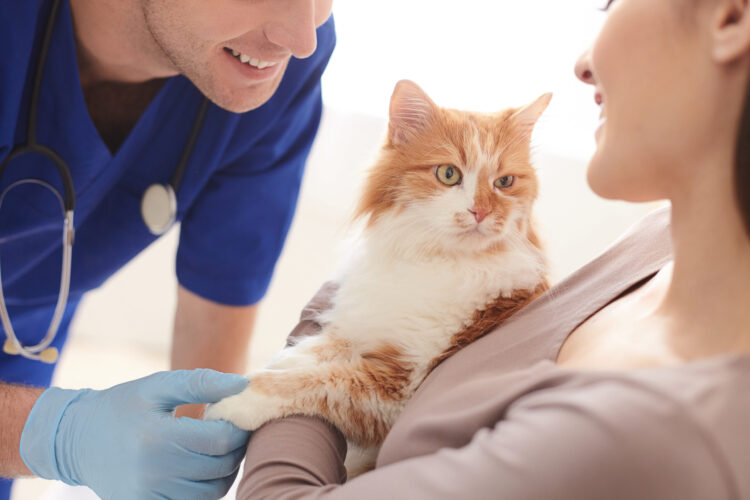
This is a sponsored post, written by: Rowyn Rose, Science Communications Specialist at Basepaws*
When your cat isn’t feeling well, you want to help them to get better as soon as possible. As a cat parent, one of the hardest things to deal with is when your cat is sick, but it’s not exactly clear what’s wrong.
Symptoms such as weight loss, decreased appetite, vomiting, and diarrhea can be associated with a wide range of feline health issues. One of these is the cancerous condition called gastrointestinal (GI) lymphoma—the #1 form of cancer seen in cats. Another is the non-cancerous condition known as inflammatory bowel disease (IBD), which causes chronic irritation and inflammation of the GI tract.
Diagnosing GI Lymphoma and IBD in Cats
Unfortunately, the physical exams and diagnostic procedures (e.g., ultrasounds) that veterinarians perform aren’t able to accurately distinguish between IBD and GI lymphoma. Exams and ultrasounds can detect signs such as thickening of a cat’s intestines or the presence of abdominal masses, but once again, these show up in the same way—regardless of whether a cat is suffering from IBD or from GI lymphoma.
It’s the most emotional ‘not confirmed’ diagnosis to get. You think your cat might have cancer, but your vet doesn’t really know, so you treat for IBD hoping your cat gets better until you know if it’s not cancer. It’s horrible.
– Pet parent of a cat with suspected IBD or GI lymphoma.
The only way to confirm if a cat has cancerous GI lymphoma vs. non-cancerous IBD is with an intestinal biopsy. While important for an accurate diagnosis, these procedures are costly for the cat parent, invasive for the cat, and stressful for both. Only 15% of cat parents choose to have biopsies performed.
A New Way for Predicting IBD and GI Lymphoma
What if there was an easier, non-invasive, and more affordable option for detecting whether a cat is suffering from IBD or from GI lymphoma? Basepaws, a pet genetics company, wants to provide this option—and they need your help today!
Basepaws created the world’s first at-home cat DNA test. With a simple 5 second swab, you get deep insight into your cat’s unique breed profile, traits, and genetic predisposition to disease. However, they also study many common feline health issues—including IBD and GI lymphoma.
The quick and painless swab from a Basepaws DNA test also provides a snapshot of the bacteria, viruses, and fungi that make up the “microbiome”, or community of microbes, that live in your cat’s mouth. Believe it or not, it turns out that the types and numbers of these microbes can be a predictor of an active disease such as IBD! Research also shows that different oral microbiome compositions are associated with both gastrointestinal cancer and IBD in humans.
Did you know?
Cats and humans share over 90% DNA, so findings in human health research can be very relevant to feline health research, and vice versa.
In addition to studying genetic predisposition to know more about a cat’s risk for developing a disease, Basepaws researches the microbial composition of cats’ mouths. Their early research findings have shown that the feline oral microbiome is a reliable predictor of IBD in cats—all this from a simple oral swab that participating cat parents did in the comfort of their own home!
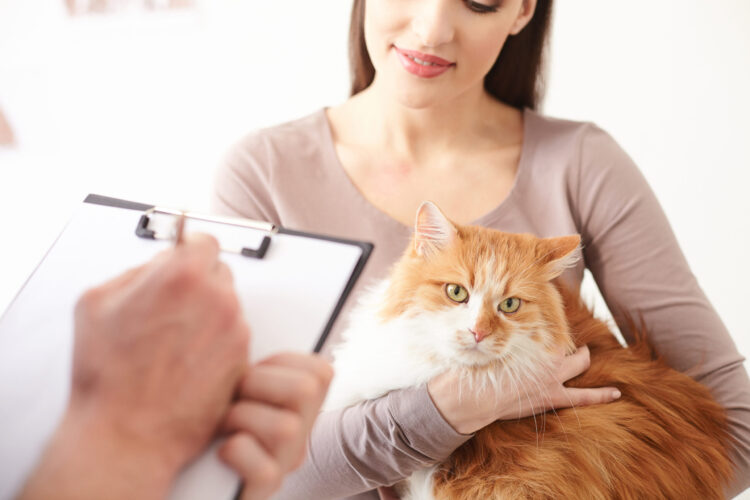
Help Basepaws Create a Healthier Future For All Cats
Basepaws is continuing its feline IBD and GI lymphoma research with the goal of developing a new oral swab test—just like their current cat DNA test—that would be an affordable early screening test for accurately detecting IBD and distinguishing it from GI lymphoma in cats. Cat parents could use this test at home, or have it performed by their veterinarian at the clinic.
Cat parents like you can participate in this research through Basepaws citizen science programs to help make this test a reality. Together, we can change the future of IBD and GI lymphoma diagnosis—so that an easier, non-invasive method of earlier detection could provide veterinarians with an additional tool that has the potential to save cat parents the stress of uncertainty as to whether their cat is suffering from IBD vs. GI lymphoma.
Witnessing the suffering of your cat, especially if they’re affected by a condition like GI lymphoma, is beyond heartbreaking. Such situations may seem like nothing positive can come out of it and you can feel completely helpless. But you can help by directly contributing to science that aims to change how we detect diseases in cats to give them every opportunity to live a happier, healthier life, for even longer.
If you qualify for a research program, you’ll get a free cat DNA test to collect your cat’s oral swab sample and a free Basepaws report to learn about their breed profile, genetic traits responsible for their unique appearance, and predisposition to common feline diseases. Basepaws pays for shipping of the test, but at this time can only accommodate cat parents based in the U.S. Please also have a digital copy of your cat’s medical records that confirm their diagnosis by your veterinarian before applying to a program.
• Apply to the Basepaws feline GI lymphoma study
• Apply to the Basepaws feline IBD study
Don’t forget to spread the word to friends and family about Basepaws’ research programs! Every DNA sample strengthens the validity of their feline health studies that can help make important at-home health screening tests available to all cat parents in the future.
REFERENCES
Richter, K.P. (2003). Feline gastrointestinal lymphoma. Veterinary Clinics of North America: Small Animal Practice, Volume 33, Issue 5: 1083-1098. Available from Science Direct at https://www.sciencedirect.com/science/article/abs/pii/S0195561603000548?via%3Dihub
Ahn, J., Chen, C. Y., & Hayes, R. B. (2012). Oral microbiome and oral and gastrointestinal cancer risk. Cancer causes & control: CCC, 23(3), 399–404. Available at https://www.ncbi.nlm.nih.gov/pmc/articles/PMC3767140/
Cornell Feline Health Center. Inflammatory Bowel Disease. Retrieved on November 15, 2022 from https://www.vet.cornell.edu/departments-centers-and-institutes/cornell-feline-health-center/health-information/feline-health-topics/inflammatory-bowel-disease
*This post is sponsored by Basepaws. We only spread the word about products and services we’ve either used or would use ourselves.
Images provided by Basepaws

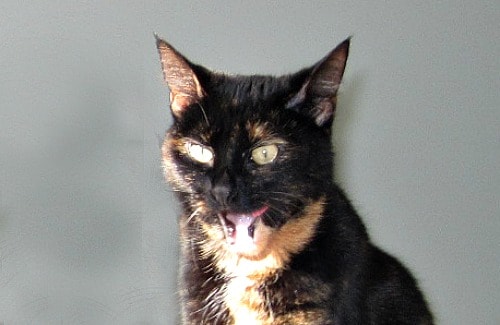
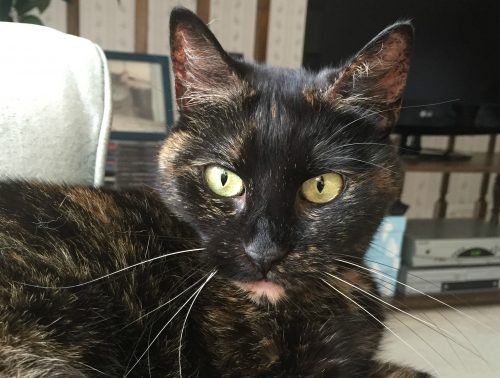
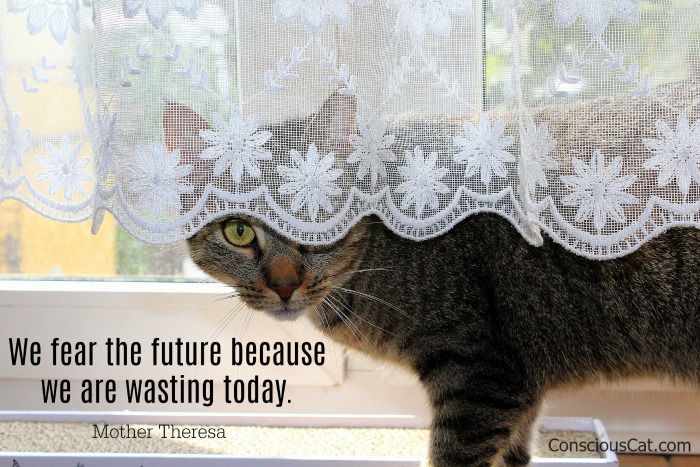
I have had 4 cats with IBD, 2 diagnosed with the gold standard of care with full-thickness biopsies (not just endoscopy as those pinch biopsies can sometimes not get to affected areas), GI/pancreatic labs (TLI/PLI/Cobalamin /Folate) and abdominal ultrasound. I treated 2 empirically (on symptoms) after GI labs and ultrasound pointed to IBD. One cat developed lymphoma
Hi Teri,
It sounds like you and your cats have gone through quite a lot. If you have any questions about Basepaws’ research programs, or resources that we may have available, please let me know.
Hi Rowyn,
I’m sure it was my erro, but not all my comment showed up… Here’s the rest of it:
One empirically treated cat, Kely, developed lymphoma. I lost one biopsied cat, Disco NoFurNo, in 2020 to complications of diabetes and heart disease. But one empirically treated cat, Brighton, and one biopsied cat, Coco, are doing great 6 years later at 16 and 17 years of age on minimal meds (budesonide and B12). Coco recently saw an IMed specialist to see if I was missing any cause for her FIC flares and I was happy to learn that her abdominal ultrasound showed good GI measurements and the expected pancreas changes stable.
Both Coco and Brighton participated in the BasePaws Citizen Science Program for IBD and can’t wait for that test to become a reality!
Hi Teri,
Thanks for sharing more about your sweet kitties, including the challenges of going through what you did with Kely and Disco NoFurNo (what a wonderful name). I’m so glad to know that Brighton and Coco are doing well, and thank you for your participation in Basepaws research! It really means a lot and every kitty’s DNA sample helps us get that much closer to making earlier detection of IBD vs. GI lymphoma, along with other common diseases, a reality for all cats.
This is really great news for future diagnosis. The quote from the pet parent is exactly what I went through with my cat Theo. Vet really did not know and Theo was diagnosed with IBD in Jan 2022. Nine months later, he was diagnosed with GI Lymphoma and passed away in early Nov. I am glad the technology is advancing but wish it was already in place for my beloved cat Theo.
Hi Gloria,
My heart goes out to you with the passing of your sweet Theo. I can only imagine how difficult that journey was for you both. Theo’s story is the very reason why we’re conducting this research at Basepaws—thank you so much for bravely sharing it here.
-Rowyn
The science behind DNA testing is amazing. This technology has really come a long way.